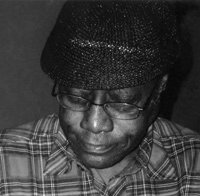rev. of Fire Ants by Gerald Duff
Fire Ants, stories by Gerald Duff (New South Books): Most of the fifteen stories in Gerald Duff’s strong collection are filled with characters who are down on their luck. A mother’s mentally handicapped son is in jail because he didn’t understand that showing a gun to the cashier at the Sac’n Pac might be interpreted as robbery, and now she has to come up with bail. A Baptist preacher must make his way out of the woods, naked, after a run-in with a group of surly Native Americans. Two children meet a madman on their way to get milk. But what makes the characters in Fire Ants compelling isn’t their problems, it’s how they solve them. They typically lack the financial, emotional or intellectual wherewithal to do it easily, so they must make do what they have: wit, will and blind faith.
As you expect from a southern writer, Duff’s characters are characters—the kind of people who might draw attention to themselves at the Piggly-Wiggly by talking too loudly, or because they still have a pink foam curler wrapped in their hair. They are best revealed through their explanations of their complicated and painful relationships with themselves, their families and God. It’s in these moments where they assert themselves that Duff shows his talent with language and characterization. In "Texas Wherever You Look," a woman who is about to go into labor reminds herself that "All that is is now, a little word and a narrow place where you must stand and one which crumbles off beneath your feet on both sides, of what was and what will be. You cannot reach either place from here." In "Believing in Memphis," a failed musician picks up two female hitchhikers hoping to make it big in the music business. After many attempts at conversation, he dismisses them with the thought, "Most people I run into, I have learned over the years, don’t like to be accused of having been influenced by anybody or anything outside of themselves in their acquiring of an outlook on the world. They like to believe they are one of a kind, you understand." Duff’s characters are most vulnerable, and compelling, when they try to convince you they are not, that they possess wisdom no one else does.
What’s particularly impressive about the collection is its wide range of voices and settings, and Duff’s ability to infuse wry humor into awkward moments, or into entire stories. "Charm City," for example, is just plain funny. Though many stories inhabit similar locations, each character speaks with a nuanced cadence that is as different as they are—a little boy who has it out for his kid sister, a forlorn woman with a serious drinking problem. Duff manages light writing in his more modern settings, like "The Angler’s Paradise Fish-Cabin Dance of Love," where the narrator "…hated to think of girls that looked the way they did, their hair all washed and shining and springy and their skin like brand new, freshly extruded latex just out of the machine, standing around in their costumes calling their boyfriends rimjobbing cool dudes…." He’s equally effective when he slows down and creates a haunted atmosphere with stilted language and winding passages. "Redemption," "The Way a Blind Man Tracks Light" and "Texas Wherever You Look" pay homage to Faulkner as they tell the story of the Hoyt family at different time periods, sometimes from the perspectives of different family members. The diversity does work against him a bit, as Duff is stronger when he’s dealing with the traditional southern fare, but even the weaker stories have plenty of merits. Fire Ants is a good addition to the Southern cannon, and will be enjoyed by anyone looking for an unexpected and satisfying read. —Anya Yurchyshyn
Anya Yurchyshyn works in the fiction department of Esquire, and is a candidate for her M.F.A. in fiction from Columbia.

